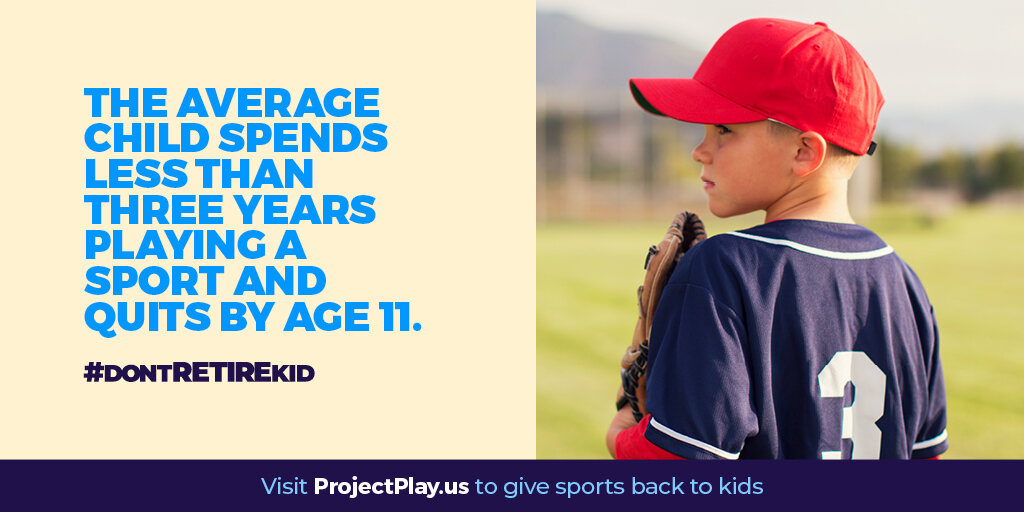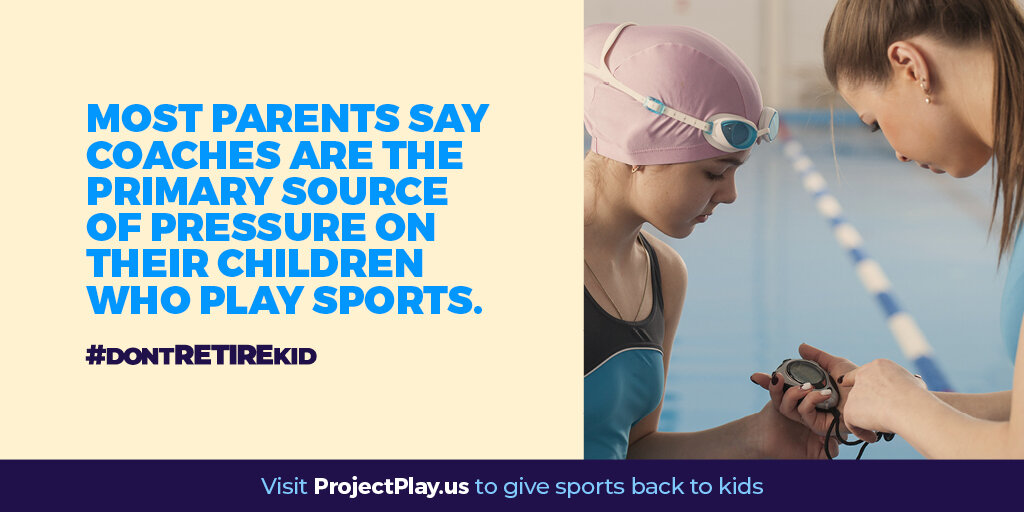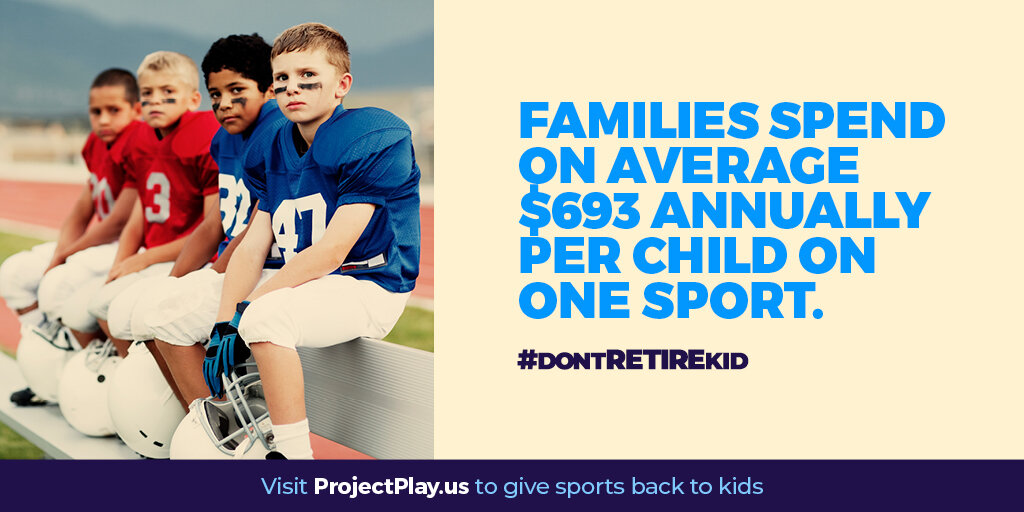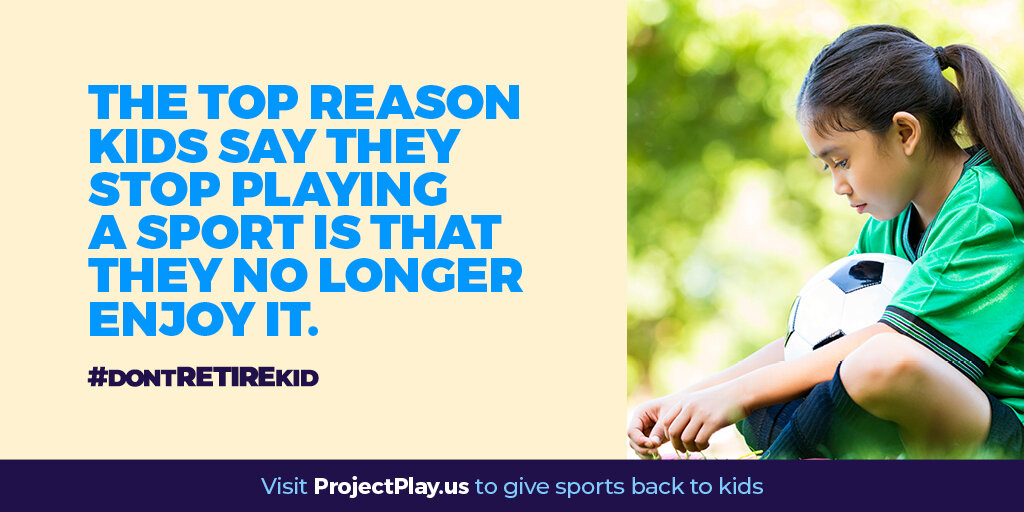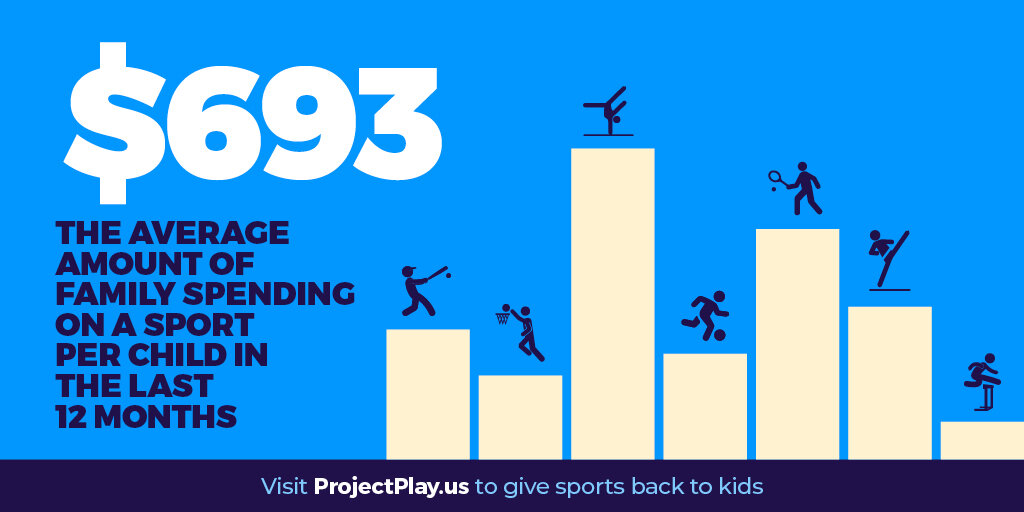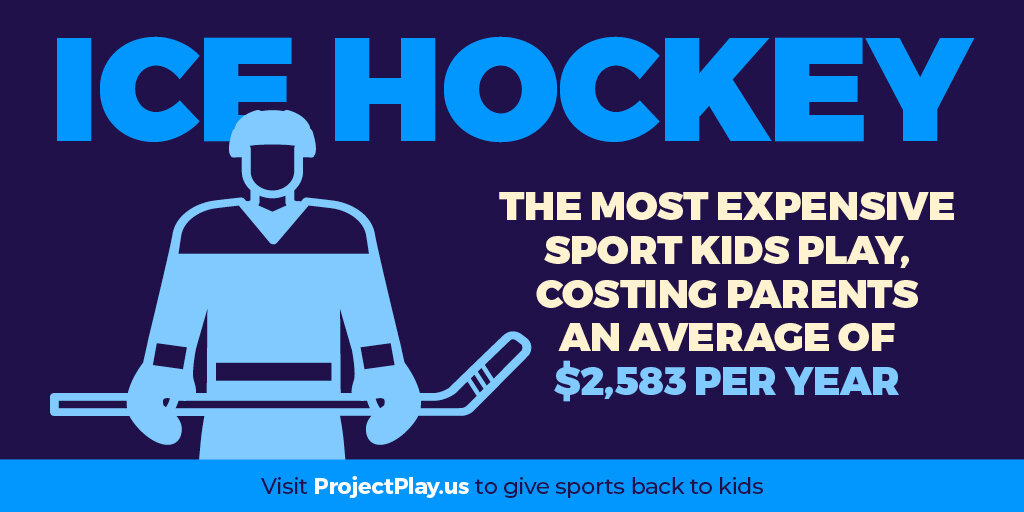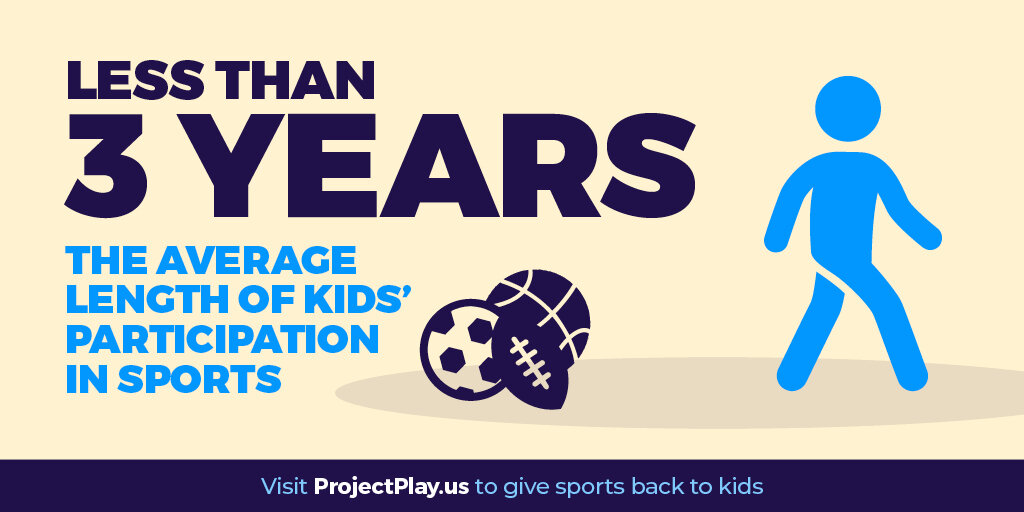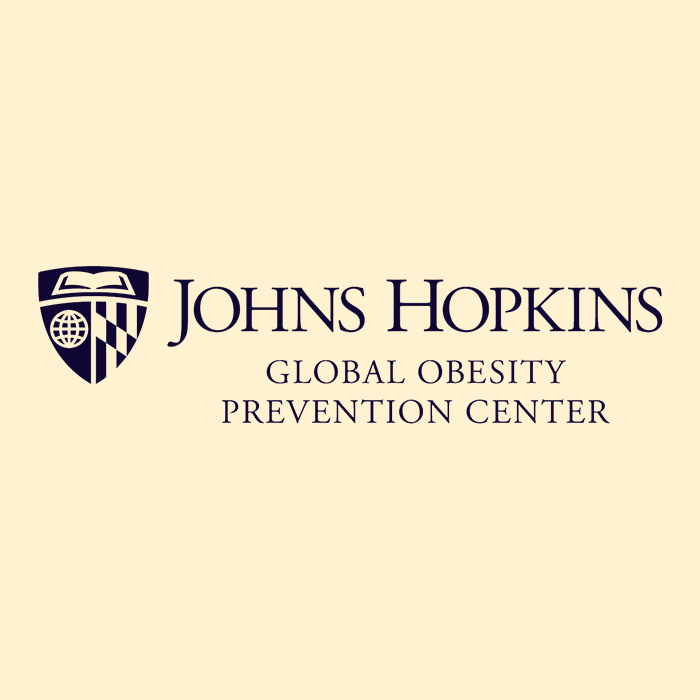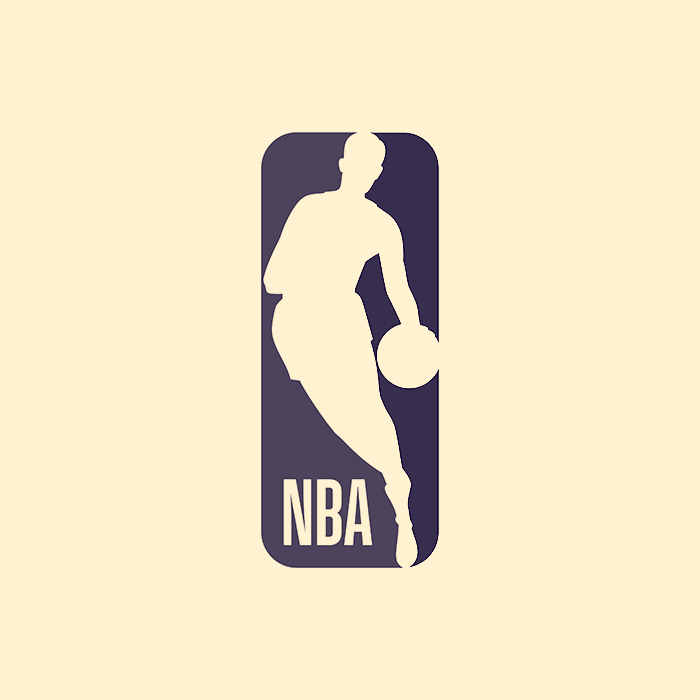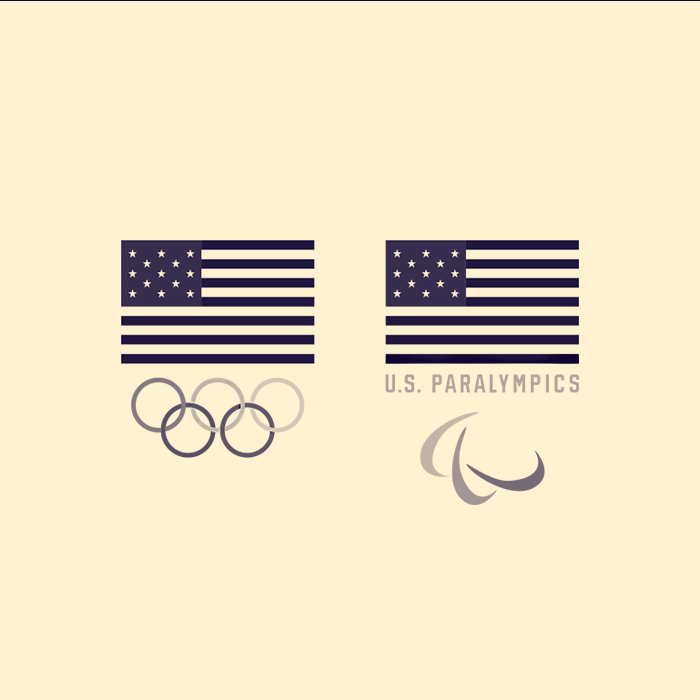The campaign generated 4.8 billion organic media impressions, 220,000 social mentions and $142 million in earned media. Traffic to the Project Play website grew more than 600% where parents, coaches and leaders could find an array of helpful resources, advice from pro athletes, and results from a new survey showing the average child spends less than three years playing a sport, quitting by age 11. Don’t Retire, Kid went on to win many social good awards, including a Halo Award, North America’s highest honor for corporate social initiatives, and four Clios, the top honor in advertising.
Thank you, COVID-19.
“We could lose some of them forever due to unforeseen pressures,” said Kevin Martinez, ESPN vice president of corporate citizenship. “We’re going to have to solve for it.”
So where to from here for Project Play 2020?
Reload. In the coming weeks, the Aspen Institute’s Sports & Society Program will announce the next iteration of Project Play 2020, called Project Play 2024. The first cohort signed on for three years, to connect silos, develop a theory of change, and lay the groundwork to grow sports participation rates and related metrics for youth, ages 12 and under. The next cohort will include many of the same organizations, plus new agents of action, committing to work together for four years.
Collective impact takes time. Trust-building leads to a shared agenda, which ignites mutually reinforcing actions and later, if sufficiently aligned, systems change. The effort is all that more challenging when applied nationally and in a space as disjointed as youth sports. But, with Aspen as the backbone facilitator, we are eager to see what the new cohort develops, building on the successes and lessons of the initial group.
The immediate challenge is:
Deeper than imagined: We now know that, from our national surveys of sports parents since the start of COVID-19, 1 in 5 kids have lost interest in their primary sport and have no desire to return. They’ve gotten a whiff of life beyond the pressures of organized sports, or maybe just fully realized the joys of Fortnight, so they’re retiring. Not good.
The biggest hit is to come, starting in the fall when school returns – online-only in many areas. Our network recognizes as much, telling us in a live poll in our most recent webinar that school sports, more than any other form for youth, are likely to suffer the most over the coming year. And in some districts, there’s still no plan on what to do with P.E.
Better than imagined: Try to order a bicycle, surfboard, or set of junior golf clubs. You may have to wait a couple months for supply chains to replenish. That’s how much demand there is for such equipment. That’s phenomenally great, given the intrinsic benefits of casual play which builds athletes for life – and healthier, more vibrant communities, the ultimate aim of Project Play.
Even youth sports organizations, at least the smart ones, are making the pivot. No provider has a richer history and investment in formal competition than Little League International, which canceled its community-based leagues and World Series due to COVID-19. So it’s promoting Sandlot Days, a format that put kids in charge and more than 100 of its leagues have now adopted. Read about how much fun kids are having and tell me you don’t want this at your local park.
Thornier than imagined: In a piece I wrote a couple months ago on how sports can help rebuild America and also tell a powerful story by the 2028 Olympics in Los Angeles, the challenge of sports governance was recognized. The U.S. Olympic and Paralympic Committee issue solid return to play guidance, as does the Centers for Disease Control and Prevention, but youth sports providers do their own thing – because they can. They only need a green light from local officials.
Even government authority is now being tested. Last week, a hockey club in St. Louis announced that it was moving ahead with practices, games and spectators on both, despite an edict from the county executive banning as much. The county was one of the first to bring back travel tournaments, in early May, and now it’s a hot spot.
The situation speaks to the challenge of promoting other best practices that can protect child athletes, from coach training to safety standards.
“It’s like 52 Card Pickup,” said Jim Boyle, vice president of programs and communication at the Ralph C. Wilson, Jr. Foundation in Detroit. “We have historically disinvested in the recreation delivery system – whether it be program, physical infrastructure, or local capacity – that provides access to the broadest audience. Now, with fewer resources, they’re being asked to design a path forward.”
The upside of crisis is it seeds the garden for new ideas, while making it impossible to ignore the structural inequities that exist in systems.
That sets the table for a discussion around policies that can and keep more youth in the game and offer the sense of belonging they need.
“We created a system that is a safety net instead of one designed to focus on what we want to accomplish which is get kids active and build people,” Martinez said. “We compartmentalized (access to sports) as nonprofit, a charitable endeavor. We’re going to need to rethink that. Like the (United Nations' Sustainable Development Goals), maybe it needs to be a right for children. Or a fundamental education tool, or a health and safety and wellness tool.”
Tom Farrey is executive director of the Aspen Institute’s Sports & Society Program, the home of Project Play. He can be followed @TomFarrey and reached at tom.farrey@aspeninstitute.org.
- Direct Lion Silver (Use of Broadcast)
- Direct Lion Bronze (Not-for-profit / Charity / Government)
- Direct Shortlist (Digital & Social / Use of Social Channels
- Entertainment for Sport Shortlist (Excellence in Sports Entertainment / Sports for Good
- PR Shortlist (Social Engagement & Influencer Marketing / Social Engagement)
- Direct Marketing Bronze Pencil (Targeted Online Video)
- Interactive & Online Bronze Pencil (Online Advertising / Native Ads
- Integrated Merit (Integrated Branding Campaign)
- Public Relations Merit (Community Building)
- Radio & Audio Merit (Broadcast - Campaign
- Social Media Merit (Active Engagement)
- Social Media Merit (Stunts & Activations
- Creative Effectiveness Shortlist (Creative Effectievness / Non-Profit / Charity)
- Creative Effectiveness Shortlist (Single Country or Region / Non-Profit / Charity)
- Public Relations Shortlist (Events or Experiential)
- Public Relations Shortlist (Media Relations)
- Social Media Shortlist (Influencer Marketing / Single Channel)
- Bronze (Public Relations / Special Event / Activation / Public Service)
- Sports Gold (Social Good / Teams, Leagues, Governing Bodies, & Associations)
- Sports Silver (Social Media / Multi-Platform / Teams, Leagues, Governing Bodies, & Associations)
- Sports Bronze (Film / 31 seconds to 60 seconds / Teams, Leagues, Governing Bodies, & Associations)
- Shortlist (Digital / Use of Trends & Tactical Marketing)
- Winner (Creative Radio Spot for a Cause: Agency / Production Company / Advertiser)
- Finalist (Best Spot for a Cause: Agency / Production Company)
- Best of Show
- Gold (Brand Amplified)
- Gold (Media is the Message)
- Gold (Work for Good)
- Bronze (Strategy & Technique: Awareness)
- Winner (Sports or Outdoor Campaign)
- Corporate Social Responsibility Award (Social Impact - Cause Advocacy Campaign)
- Corporate Social Responsibility Honorable Mention (Grand Prize - CSR Campaign of the Year)
- Silver (Media Cut / Alternative / Nonprofit)
- Silver (Video)
- Winner (Awareness Campaign for a Social Good Initiative
OUR PARTNERS
Don't Retire, Kid is an initiative of Project Play 2020, which is comprised of leading organizations to help make sports accessible to all kids, regardless of zip code or ability.



